Charles E W Bean, Diaries, AWM38 3DRL 606/199/1 - August - November 1918 - Part 2
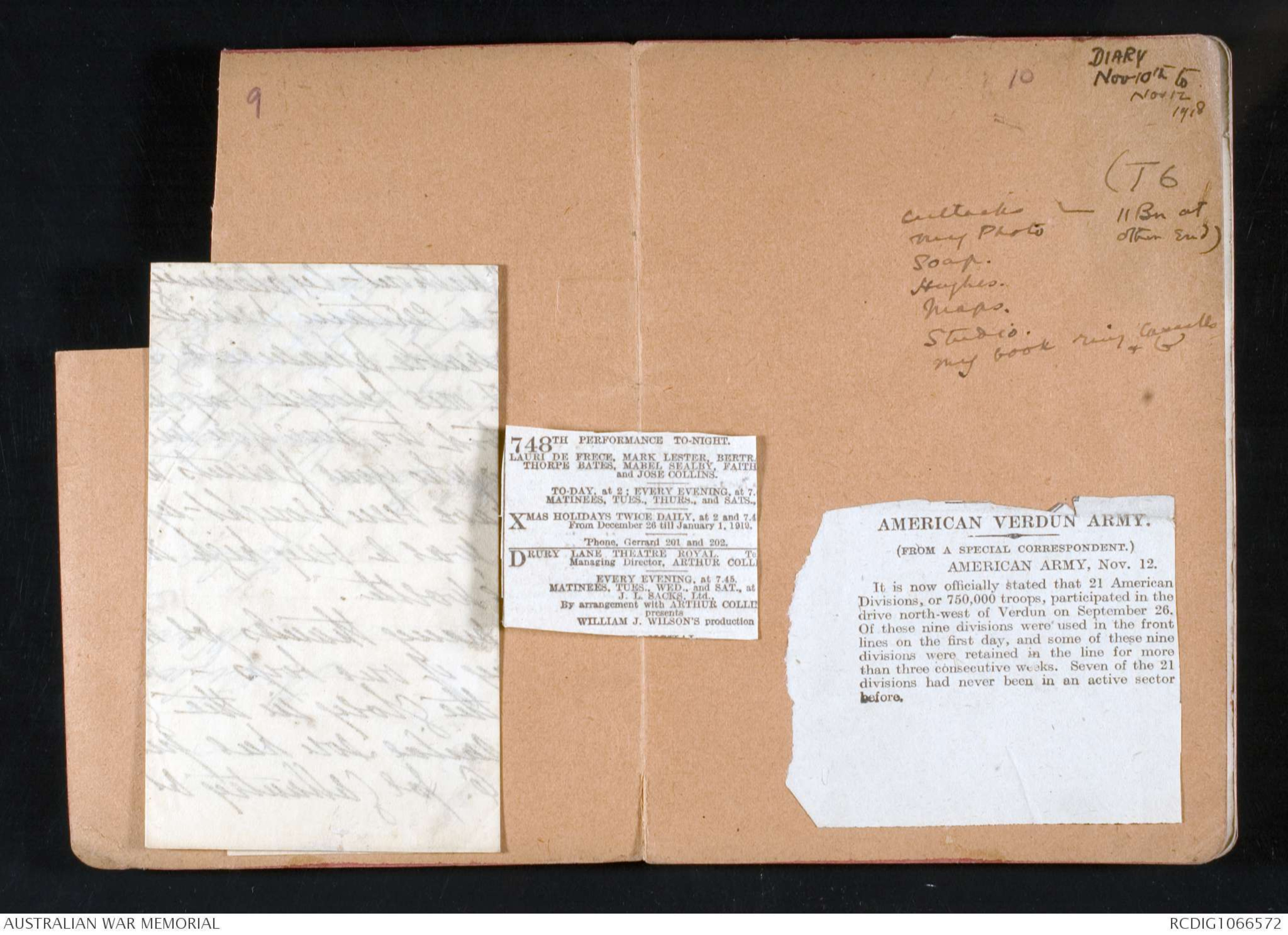
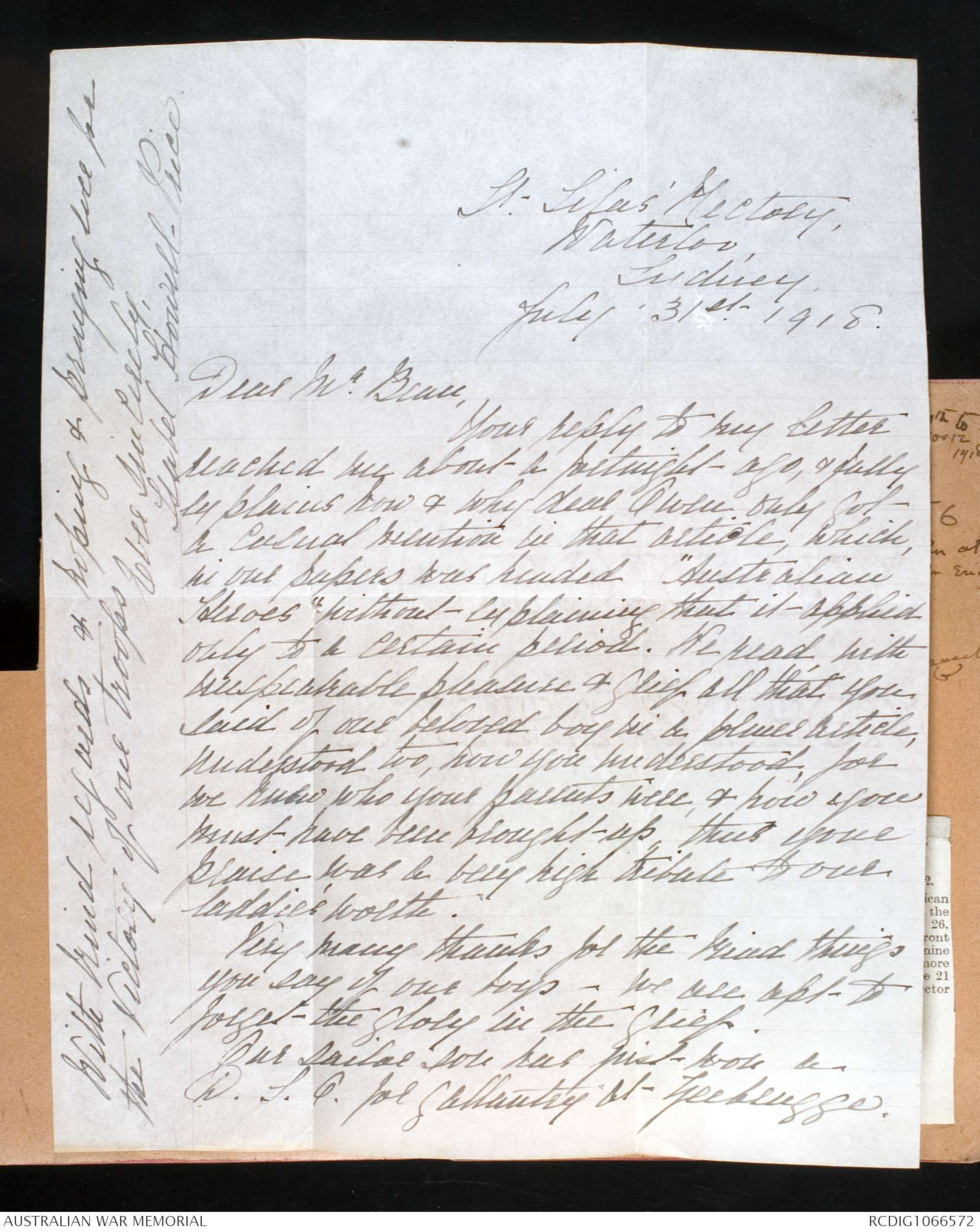
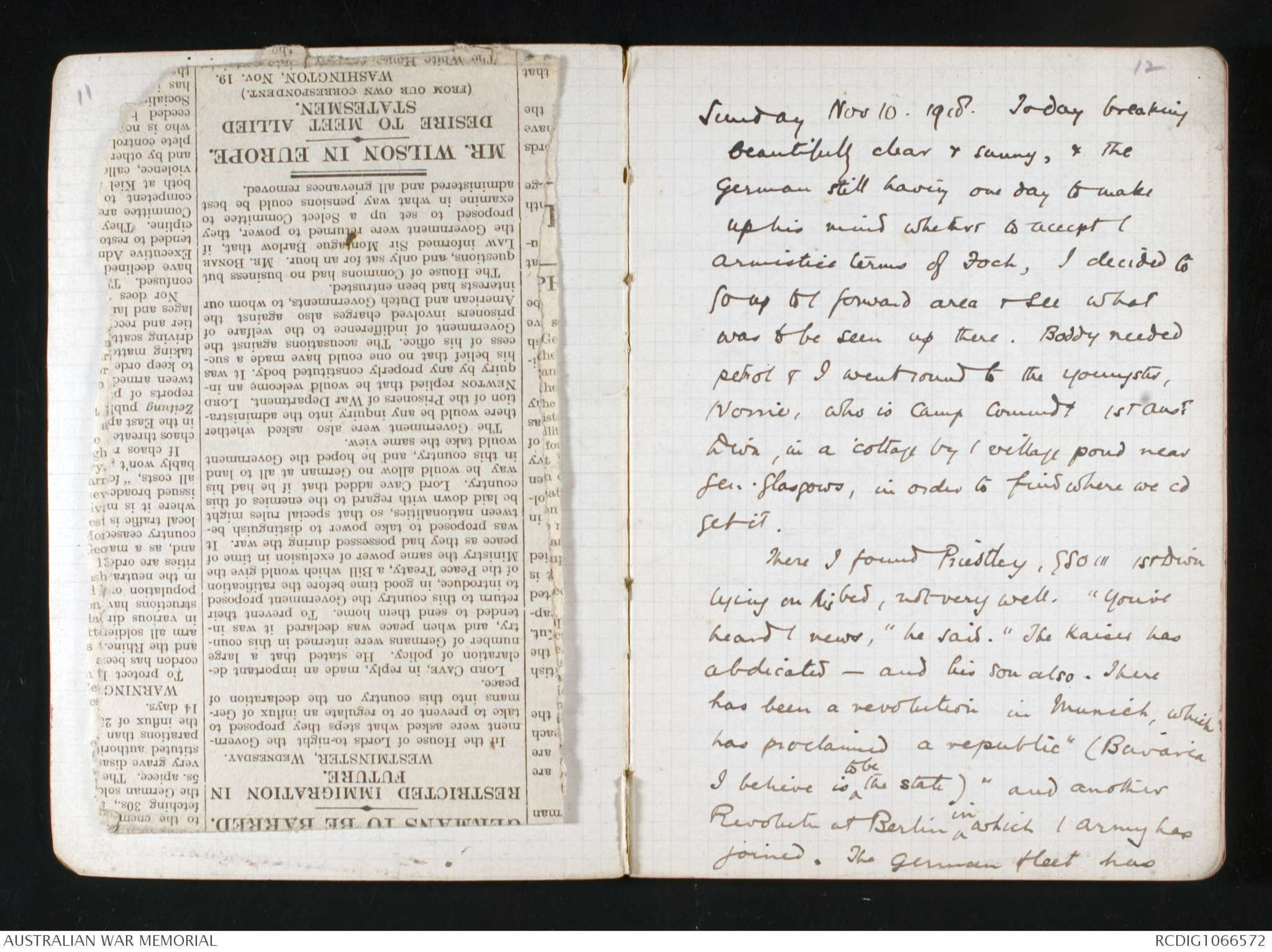
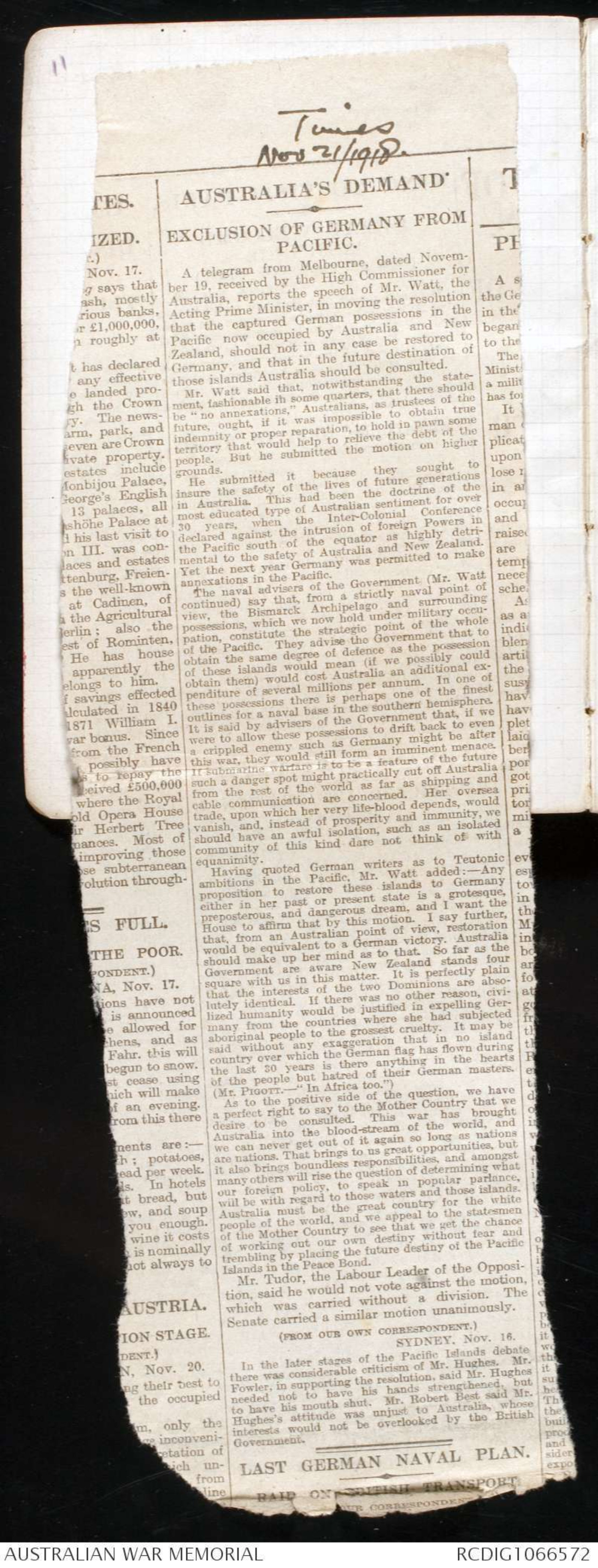
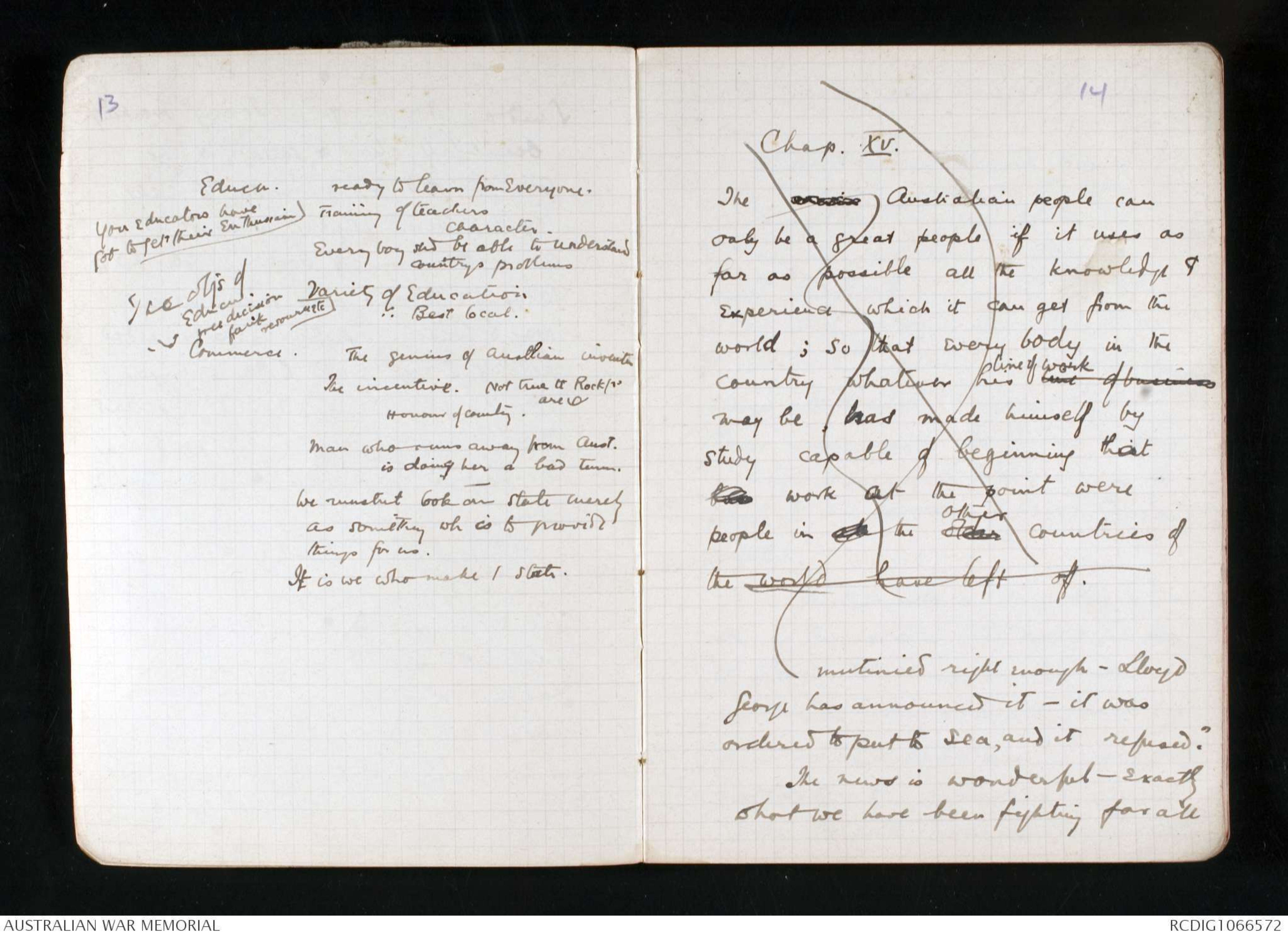
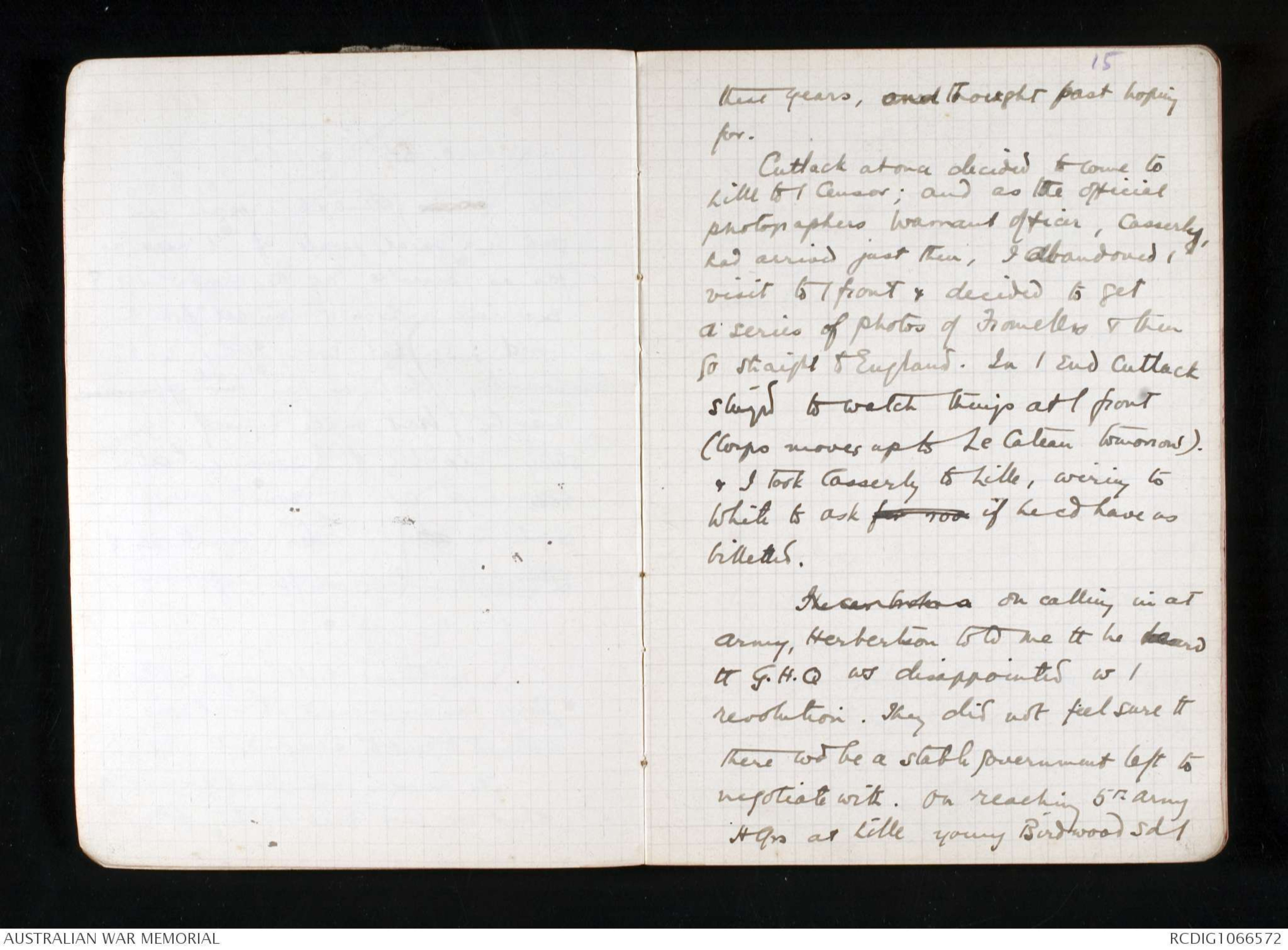
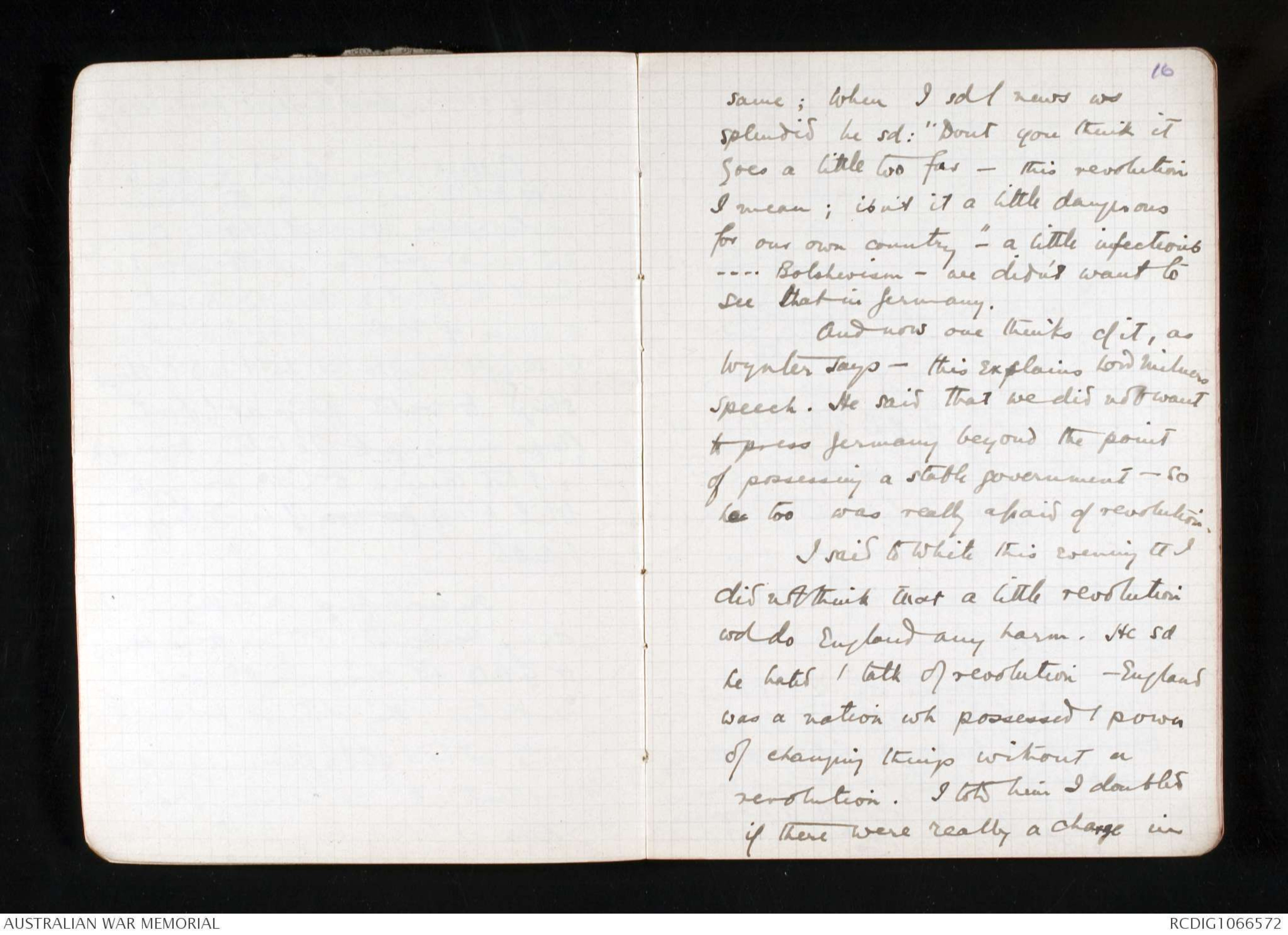
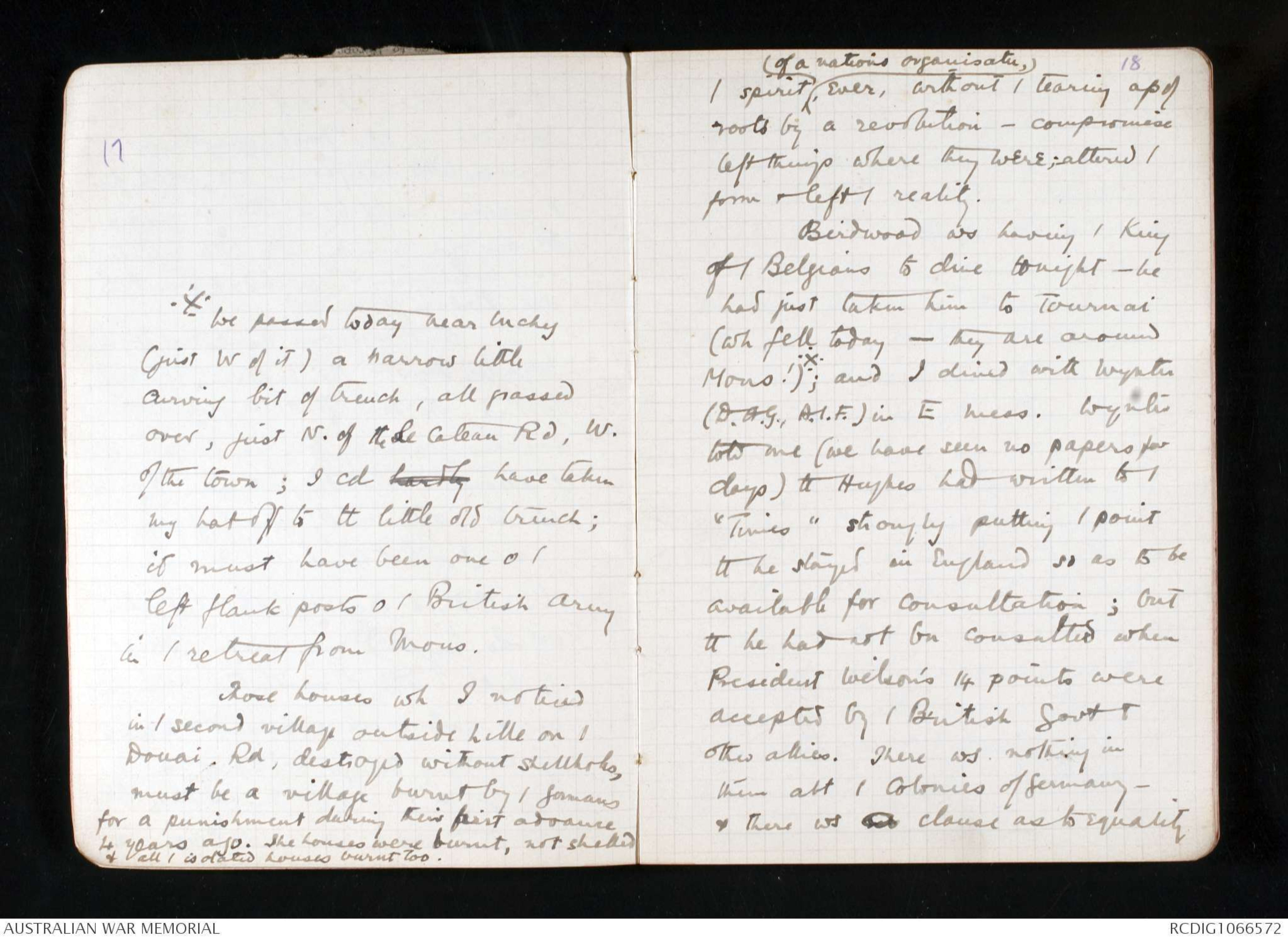
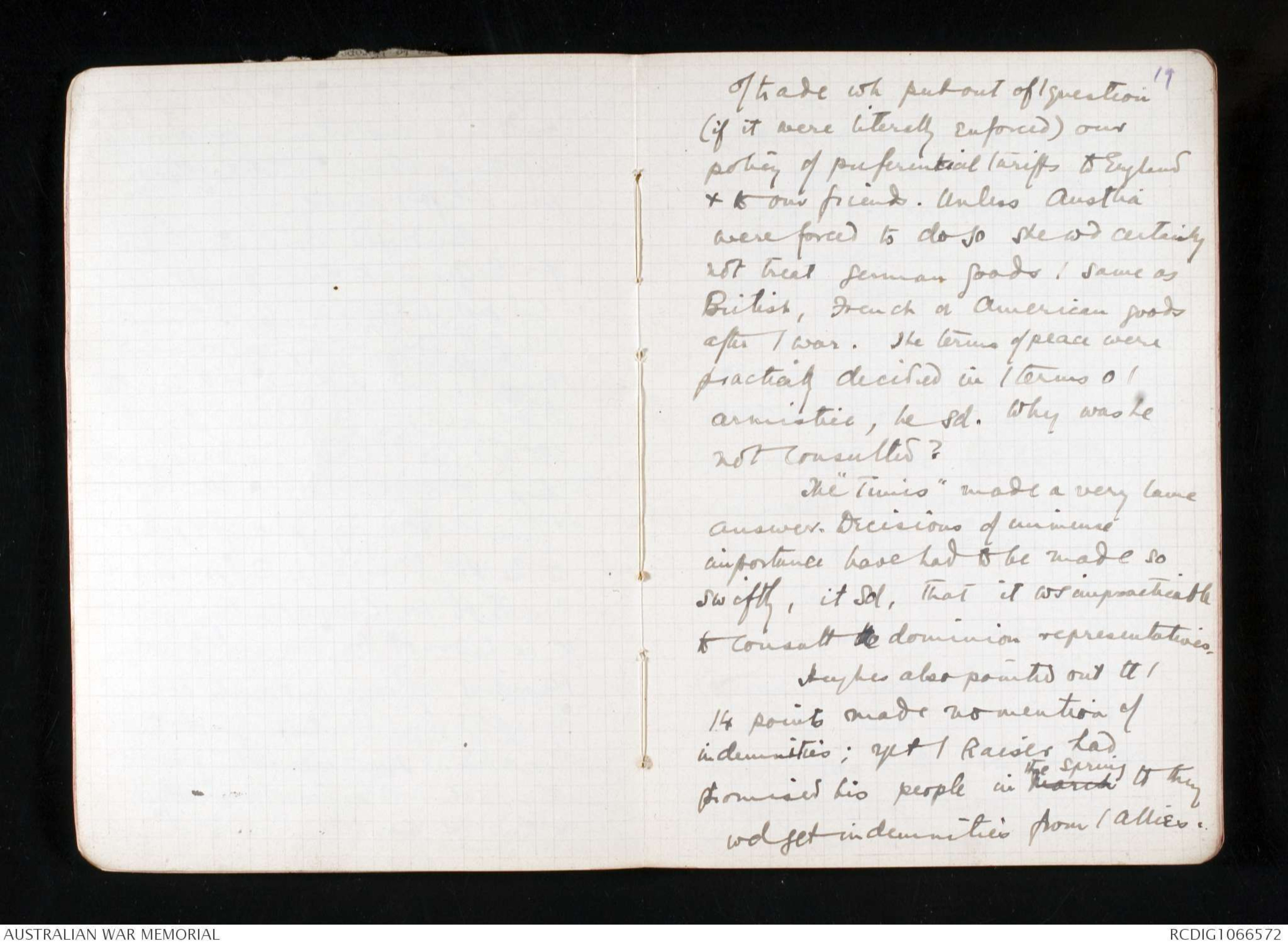
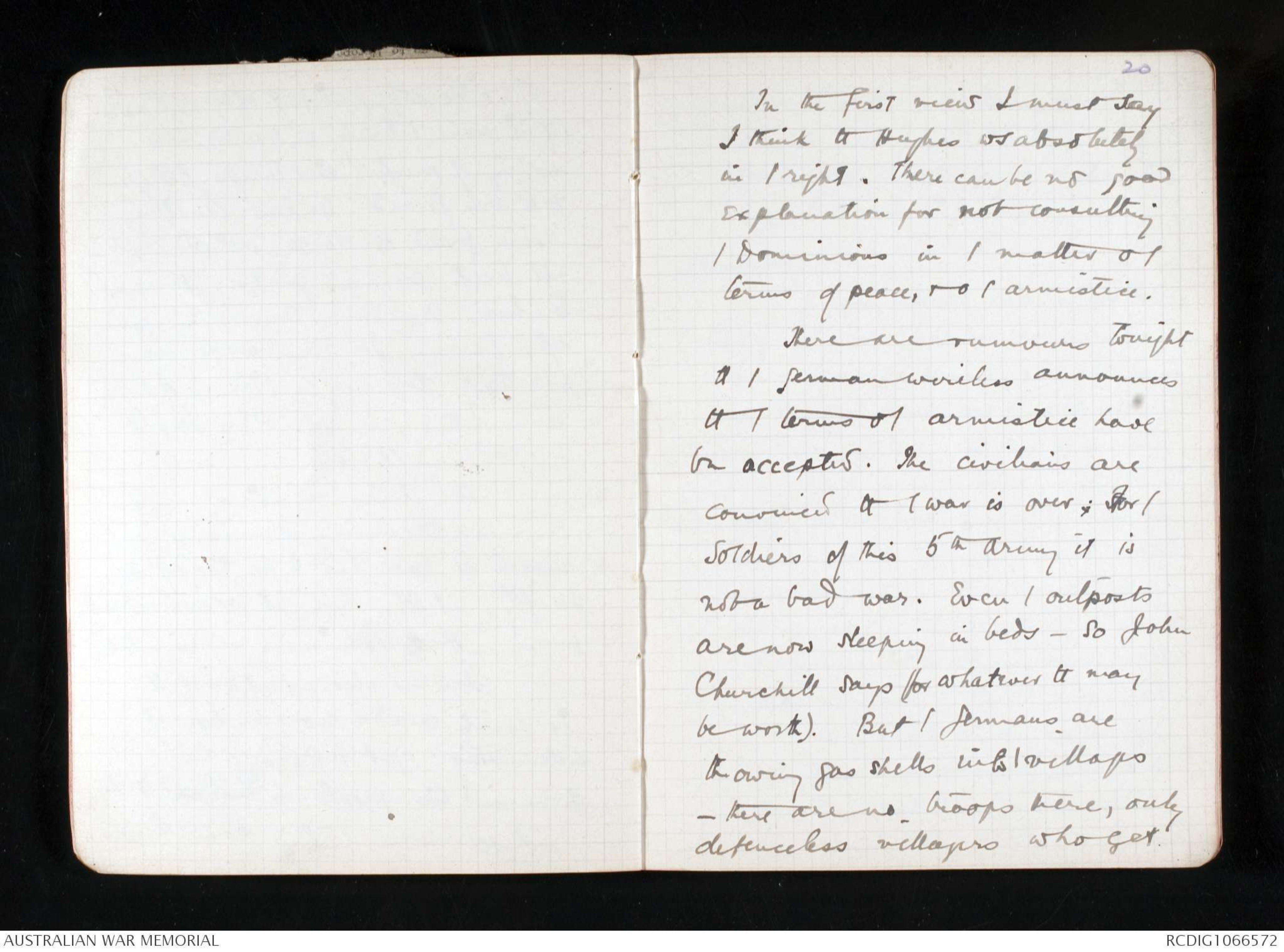
9
748TH PERFORMANCE TO-NIGHT
LAURI DE FRECE, MARK LESTER, BERTR
THORPE BATES, MABEL SEALBY, FAITH
and JOSE COLLINS.
TO-DAY, at 2 : EVERY EVENING, at 7.
MATINEES, TUES., THURS., and SATS.,
XMAS HOLIDAYS TWICE DAILY, at 2 and 7.4
From December 26 till January 1, 1919.
'Phone, Gerrard 201 and 202.
DRURY LANE, THEATRE ROYAL. To
Managing Director, ARTHUR COLL
EVERY EVENING, at 7.45,
MATINEES, TUES., WED., and SAT., at
J. L. SACKS, Ltd.,
By arrangement with ARTHUR COLLIN
presents
WILLLAM J. WILSON'S production
10
DIARY
Nov 10th to
Nov 12
1918
(T6
11 Bn at
other end)
Cultack's book
My Photo
Soap.
Hughes.
Maps.
Studio.
My book ring Cassells
& finish
AMERICAN VERDUN ARMY.
(FROM A SPECIAL CORRESPONDENT.)
AMERICAN ARMY, Nov. 12.
It is now officially stated that 21 American
Divisions, or 750,000 troops, participated in the
drive north-west of Verdun on September 26.
Of these nine divisions were used in the front
lines on the first day, and some of these nine
divisions were retained in the line for more
than three consecutive weeks. Seven of the 21
divisions had never been in an active sector
before.
St. Silas' Rectory,
Waterloo,
Sydney,
July 31st 1918.
Dear Mr Bean,
Your reply to my letter
reached me about a fortnight ago, & fully
explains how & why dear Owen only got
a casual mention in that article, which,
in our papers was headed "Australian
Heroes" without explaining that it applied
only to a certain period. We read, with
unspeakable pleasure & grief all that you
said of our beloved boy in a [[press?]] article,
understood too, how you understood, for
we knew who your parents were, & how you
must have been brought up, thus your
praise was a very high tribute to our
laddies' worth.
Very many thanks for the kind things
you say of our boys - we are apt to
forget the glory in the grief.
Our sailor son has just won a
D.S.O. for gallantry at Zeebrugge.
[*With kind regards & hoping & praying all for
the victory of our troops
Ever Sincerely,
Isabel Howell-Price*]
11
GERMANS TO BE BARRED.
RESTRICTED IMMIGRATION IN
FUTURE.
WESTMINSTER, WEDNESDAY.
In the House of Lords to-night the Government
were asked what steps they proposed to
take to prevent or to regulate an influx of Germans
into this country on the declaration of
peace.
LORD CAVE, in reply, made an important declaration
of policy. He stated that a large
number of Germans were interned in this country,
and when peace was declared it was intended
to send them home. To prevent their
return to this country the Government proposed
to introduce, in good time before the ratification
of the Peace Treaty, a Bill which would give the
Ministry the same power of exclusion in time of
peace as they had possessed during the war. It
was proposed to take power to distinguish between
nationalities, so that special rules might
be laid down with regard to the enemies of this
country. Lord Cave added that if he had his
way he would allow no German at all to land
in this country, and he hoped the Government
would take the same view.
The Government were also asked whether
there would be any inquiry into the administration
of the Prisoners of War Department. LORD
NEWTON replied that he would welcome an inquiry
by any properly constituted body. It was
his belief that no one could have made a success
of his office. The accusations against the
Government of indifference to the welfare of
prisoners involved charges also against the
American and Dutch Governments, to whom our
interests had been entrusted.
The House of Commons had no business but
questions, and only sat for an hour. MR. BONAR
LAW informed Sir Montague Barlow that, if
the Government were returned to power, they
proposed to set up a Select Committee to
examine in what way pensions could be best
administered and all grievances removed.
MR. WILSON IN EUROPE.
DESIRE TO MEET ALLIED
STATESMEN.
(FROM OUR OWN CORRESPONDENT.)
WASHINGTON, Nov. 19.
12
Sunday Nov 10. 1918. Today breaking
beautifully clear & sunny, & the
German still having one day to make
up his mind whether to accept /
armistice terms of Foch, I decided to
go up to / forward area & see what
was to be seen up there. Boddy needed
petrol & I went round to the youngster,
Norrie, who is Camp Commdt 1st Aust
Divn, in a cottage by / village pond near
Gen. Glasgows, in order to find where we cd
get it.
There I found Priestley, GSO III 1st Divn
lying on his bed, not very well. "You've
heard / news," he said. "The Kaiser has
abdicated - and his son also. There
has been a revolution in Munich, which
has proclaimed a republic" (Bavaria
I believe is ^to be the state) "and another
Revolutn at Berlin ^in which / army has
joined. The German fleet has
11
[*Times
Nov 21/1918.*]
AUSTRALIA'S DEMAND*
EXCLUSION OF GERMANY FROM
PACIFIC.
A telegram from Melbourne, dated November
19, received by the High Commissioner for
Australia, reports the speech of Mr. Watt, the
Acting Prime Minister, in moving the resolution
that the captured German possessions in the
Pacific now occupied by Australia and New
Zealand, should not in any case be restored to
Germany, and that in the future destination of
those islands Australia should be consulted.
Mr. Watt said that, notwithstanding the statement,
fashionable in some quarters, that there should
be "no annexations," Australians, as trustees of the
future, ought, if it was impossible to obtain true
indemnity or proper reparation, to hold in pawn some
territory that would help to relieve the debt of the
people. But he submitted the motion on higher
grounds.
He submitted it because they sought to
insure the safety of the lives of future generations
in Australia. This had been the doctrine of the
most educated type of Australian sentiment for over
30 years, when the Inter-Colonial Conference
declared against the intrusion of foreign Powers in
the Pacific south of the equator as highly detrimental
to the safety of Australia and New Zealand.
Yet the next year Germany was permitted to make
annexations in the Pacific.
The naval advisers of the Government (Mr. Watt
continued) say that, from a strictly naval point of
view, the Bismarck Archipelago and surrounding
possessions, which we now hold under military occupation,
constitute the strategic point of the whole
of the Pacific. They advise the Government that to
obtain the same degree of defence as the possession
of these islands would mean (if we possibly could
obtain them) would cost Australia an additional expenditure
of several millions per annum. In one of
these possessions there is perhaps one of the finest
outlines for a naval base in the southern hemisphere.
It is said by advisers of the Government that, if we
were to allow these possessions to drift back to even
a crippled enemy such as Germany might be after
this war, they would still form an imminent menace.
If submarine warfare is to be a feature of the future
such a danger spot might practically cut off Australia
from the rest of the world as far as shipping and
cable communication are concerned. Her oversea
trade, upon which her very life-blood depends, would
vanish, and, instead of prosperity and immunity, we
should have an awful isolation, such as an isolated
community of this kind dare not think of with
equanimity.
Having quoted German writers as to Teutonic
ambitions in the Pacific, Mr. Watt added:— Any
proposition to restore these islands to Germany
either in her past or present state is a grotesque,
preposterous, and dangerous dream., and I want the
House to affirm that by this motion. I say further,
that, from an Australian point of view, restoration
would be equivalent to a German victory. Australia
should make up her mind as to that. So far as the
Government are aware New Zealand stands four
square with us in this matter. It is perfectly plain
that the interests of the two Dominions are absolutely
identical. if there was no other reason, civilized
humanity would be justified in expelling Germany
from the countries where she had subjected
aboriginal people to the grossest cruelty. It may be
said without any exaggeration that in no island
country over which the German flag has flown during
the last 30 years is there anything in the hearts
of the people but hatred of their German masters.
(Mr. PIGOTT. — "In Africa too.")
As to the positive side of the question, we have
a perfect right to say to the Mother Country that we
desire to be consulted. This war has brought
Australia into the blood-stream of the world, and
we can never get out of it again so long as nations
are nations. That brings to us great opportunities, but
it also brings boundless responsibilities, and amongst
many others will rise the question of determining what
our foreign policy, to speak in popular parlance,
will be with regard to those waters and those islands.
Australia must be the great country for the white
people of the world, and we appeal to the statesmen
of the Mother Country to see that we get the chance
of working out our own destiny without fear and
trembling by placing the future destiny of the Pacific
Islands in the Peace Bond.
Mr. Tudor, the Labour Leader of the Opposition,
said he would not vote against the motion,
which was carried without a division. The
Senate carried a similar motion unanimously.
(FROM OUR OWN CORRESPONDENT.)
SYDNEY, Nov. 16.
In the later stages of the Pacific Islands debate
there was considerable criticism of Mr. Hughes. Mr.
Fowler, in supporting the resolution, said Mr. Hughes
needed not to have his hands strengthened, but
to have his mouth shut. Mr. Robert Best said Mr.
Hughes's attitude was unjust to Australia, whose
interests would not be overlooked by the British
Government.
LAST GERMAN NAVAL PLAN.
RAID ON BRITISH TRANSPORT
13
Educn. ready to learn from Everyone
[*You educators have
got to get their enthusiasm*]
Training of teachers
Character
Every boy shd be able to understand
countrys problems.
Variety of Education
... Best local.
[*The objs of
Educn.
free decision
frank
resource etc*]
Commerce. The genius of Austlian inventn
The incentive. Not true tt Rock/rs
are necessary
Honour of country.
Man who runs away from Aust.
is doing her a bad turn.
We mustnt look on state merely
as something wh is to provide
things for us.
It is we who made / state.
14
Chap. XV.
The xxxxx Australian people can
only be a great people if it uses as
far as possible all the knowledge &
experience which it can get from the
world; so that every body in the
country whatever his line of business line of work
may be, has made himself by
study capable of beginning thatbus work at the point were
people in all the older other countries of
the world have left off.
mentioned right enough - Lloyd
George has announced it - it was
ordered to put to sea, and it refused."
The news is wonderful - exactly
what we have been fighting for all
15
these years, and thought past hoping
for.
Cutlack at once decided to come to
Lille to / Censor; and as the official
photographers Warrant Officer, Casserly,
had arrived just then, I abandoned /
visit to / front & decided to get
a series of photos of Fromelles & then
go straight to England. In / end Cutlack
stayed to watch things at / front
(Corps moves up to Le Cateau tomorrow).
& I took Casserly to Lille, wiring to
White to ask for roo if he cd have us
billetted.The car took a On calling in at
Army, Herbertson told me tt he heard
tt G.H.Q. ws disappointed w /
revolution. They did not feel sure tt
there wd be a stable government left to
negotiate with. On reaching 5th Army
HQrs at Lille young Birdwood sd /
16
same; when I sd / news ws
splendid he sd: "Dont you think it
goes a little too far - this revolution
I mean; isn't it a little dangerous
for our own country" - a little infectious
- - - - Bolshevism - we didn't want to
see that in Germany.
And now one thinks of it, as
Wynter says - this explains Lord Milners
speech. He said that we did not want
to press Germany beyond the point
of possessing a stable government - so
he too was really afraid of revolution.
I said to White this evening tt I
did not think that a little revolution
wd do England any harm. He sd
he hated / talk of revolution - England
was a nation wh possessed / power
of changing things without a
revolution. I told him I doubted
if there were really a change in
17
※ We passed today near Inchy
(just W of it) a narrow little
curving bit of trench, all grassed
over, just N. of the Le Cateau Rd, W.
of the town; I cd hardly have taken
my hat off to tt little old trench;
it must have been one o /
left flank posts o / British Army
in / retreat from Mons.
Those houses wh I noticed
in / second village outside Lille on /
Douai. Rd, destroyed without shellholes,
must be a village burnt by / Germans
for a punishment during their first advance
4 years ago. The houses were burnt, not shelled
& all / isolated houses burnt too.
18
/ spirit ^of a nations organisatn, ever, without / tearing up of
roots by a revolution - compromise
left things where they were; altered /
form & left / reality.
Birdwood ws having / King
of / Belgians to dine tonight - he
had just taken him to Tournai
(wh fell today - they are around
Mons!]※; and I dined with Wynter
(D.A.G., A.I.F.) in E mess. Wynter
told me (we have seen no papers for
days) tt Hughes had written to /
"Times" strongly putting / point
tt he stayed in England so as to be
available for consultation; but
tt he had not bn consulted when
President Wilson's 14 points were
accepted by / British Govt &
other allies. There ws nothing in
them abt / Colonies of Germany -
& there ws a clause as to equality
19
of trade wh put out of / question
(if it were literally enforced) our
policy of preferential tariffs to England
& to our friends. Unless Austlia
were forced to do so she wd certainly
not treat German goods / same as
British, French or American goods
after / war. The terms of peace were
practically decided in / terms o /
armistice, he sd. Why was he
not consulted?
The "Times" made a very lame
answer. Decisions of immense
importance have had to be made so
swiftly, it sd, that it ws impracticable
to consult the dominion representatives.
Hughes also pointed out tt /
14 points made no mention of
indemnities; yet / Kaiser had
promised his people in March the Spring tt they
wd get indemnities from / Allies.
20
In the first view I must say
I think tt Hughes ws absolutely
in / right. There can be no good
explanation for not consulting
/ Dominions in / matter o /
terms of peace, & o / armistice.
There are rumours tonight
tt / German wireless announces
tt / terms o / armistice have
bn accepted. The civilians are
convinced tt / war is over. For /
soldiers of this 5th Army it is
not a bad war. Even / outposts
are now sleeping in beds - so John
Churchill says for whatever tt may
be worth). But / Germans are
throwing gas shells into / villages
- there are no troops there, only
defenceless villagers who get
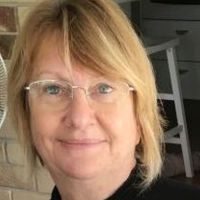 Diane Ware
Diane WareThis transcription item is now locked to you for editing. To release the lock either Save your changes or Cancel.
This lock will be automatically released after 60 minutes of inactivity.